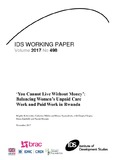‘You Cannot Live Without Money’: Balancing Women’s Unpaid Care Work and Paid Work in Rwanda
| dc.contributor.author | Rohwerder, Brigitte | |
| dc.contributor.author | Müller, Catherine | |
| dc.contributor.author | Nyamulinda, Birasa | |
| dc.contributor.author | Chopra, Deepta | |
| dc.contributor.author | Zambelli, Elena | |
| dc.contributor.author | Hossain, Naomi | |
| dc.coverage.spatial | Rwanda | en |
| dc.date.accessioned | 2017-11-08T14:38:20Z | |
| dc.date.available | 2017-11-08T14:38:20Z | |
| dc.date.issued | 2017-11 | |
| dc.identifier.citation | Rohwerder, B.; Müller, C. and Nyamulinda, B. with Chopra, D.; Zambelli, E. and Hossain, N. (2017) ‘You Cannot Live Without Money’: Balancing Women’s Unpaid Care Work and Paid Work in Rwanda, IDS Working Paper 498, Brighton: IDS | en |
| dc.identifier.isbn | 978-1-78118-398-4 | |
| dc.identifier.issn | 2040-0209 | |
| dc.identifier.uri | https://opendocs.ids.ac.uk/opendocs/handle/20.500.12413/13337 | |
| dc.description.abstract | This paper summarises the findings of mixed-methods research that was carried out in Rwanda as part of the ‘Balancing Unpaid Care Work and Paid Work: Successes, Challenges and Lessons for Women’s Economic Empowerment Programmes and Policies’ research project (2015–17). It reflects the voices and experiences of women and their household members participating in women’s economic empowerment (WEE) programmes across four sites in the rural districts of Musanze and Huye. Participants in two WEE programmes are represented, namely the state-run Vision 2020 Umurenge Programme (VUP), and ActionAid Rwanda’s Food Security and Economic Empowerment Programme. The question addressed by the research was: How can women’s economic empowerment (WEE) policies and programmes take unpaid care work into account in order to enable women’s economic empowerment to be optimised, shared across families and sustained across generations? This study and its findings indicate that women are the primary caregivers in families, although older children in particular and spouses to some extent also engage in some care tasks. There is little help with care from outside the nuclear family. Women’s paid work opportunities are more limited than men’s because of gender norms around certain types of work and because they have less time to find out about paid work opportunities due to their involvement in care work. Women may do more than one job, and much paid work is temporary, occasional and irregular, as well as seasonal. Women’s income from paid work is important; but, whether sole earnings or combined, it is not always enough to meet household needs. Balancing paid and unpaid work is a daunting task for the majority of women. Both care and paid work are often physically challenging and time consuming. Women have little time for leisure and personal use. Women who are the sole adult earners and carers for their families are struggling the most. Women who are relatively better off tend to live in families which have other adults also contributing to providing income and care. | en |
| dc.description.sponsorship | UK Department for International Development | en |
| dc.description.sponsorship | International Development Research Centre (IDRC) | en |
| dc.description.sponsorship | Hewlett Foundation | en |
| dc.language.iso | en | en |
| dc.publisher | Institute of Development Studies | en |
| dc.relation.ispartofseries | IDS Working Paper;498 | |
| dc.rights | This is an Open Access paper distributed under the terms of the Creative Commons Attribution Non Commercial 4.0 International licence, which permits downloading and sharing provided the original authors and source are credited – but the work is not used for commercial purposes. http://creativecommons.org/licenses/by-nc/4.0/legalcode | en |
| dc.rights.uri | http://creativecommons.org/licenses/by-nc/4.0/ | en |
| dc.subject | Gender | en |
| dc.subject | Work and Labour | en |
| dc.title | ‘You Cannot Live Without Money’: Balancing Women’s Unpaid Care Work and Paid Work in Rwanda | en |
| dc.type | IDS Working Paper | en |
| dc.rights.holder | Institute of Development Studies | en |
| dc.identifier.team | Governance | en |
| rioxxterms.funder | Default funder | en |
| rioxxterms.identifier.project | Default project | en |
| rioxxterms.version | VoR | en |
| rioxxterms.funder.project | 9ce4e4dc-26e9-4d78-96e9-15e4dcac0642 | en |
Files in this item
This item appears in the following Collection(s)
-
Balancing unpaid work and paid work [20]
Explores the successes, challenges and lessons for Women’s Economic Empowerment programmes and policies -
IDS Research [1671]
Except where otherwise noted, this item's license is described as This is an Open Access paper distributed under the terms of the Creative Commons Attribution Non Commercial 4.0
International licence, which permits downloading and sharing provided the original authors and source are credited –
but the work is not used for commercial purposes. http://creativecommons.org/licenses/by-nc/4.0/legalcode


